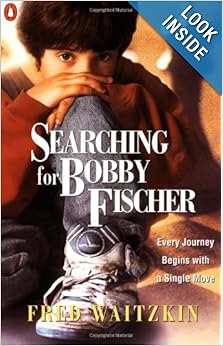One of the great privileges of being the Rabbi of a city like Omaha is that over the last 10 years I have had the privilege of meeting and spending time with some truly amazing people, including Natan Sharansky, Michael Oren, and of course Warren Buffett.
Yet I cannot ever remember being as excited to meet someone as I am right now! Boris Gulko is truly a great Jewish hero and it is such a great honor to host him this Shabbos on Good Shabbos Nebraska! The feeling right now is indescribable. Everyone MUST come to meet this great man this Shabbos at 10am at Beth Israel!
The following is another excerpt from the book Searching for Bobby Fischer: The World of Chess, Observed by the Father of a Child Prodigy.
“In 1978 Anna and I applied for emigration to Israel. I
wanted to live without chess management, but chess management
didn’t want to live without me.” Gulko laughed
quietly. “Until then we both were paid for being chess players, but after we
applied for emigration all income stopped. They didn’t invite me to any
tournaments, even those in this country. For two years I was not allowed to
play a single game. For two years I waited. It was destroying me. Anna was in
the same situation. We went on a hunger strike in 1980, and after that I was
allowed to play in the Moscow Open. I suppose they didn’t consider me a threat
to win, because it was a very strong tournament and I was out of practice.”To the dismay of the authorities, Gulko did win, and during the awards ceremony at the Central Chess Club, he asked to speak. A hush fell over the gathering as he addressed the Soviet Chess Federation and asked that Victor Korchnoi’s wife and son be allowed to leave the Soviet Union to join him in exile. After the speech players and guests paused to shake Gulko’s hand.
Volodja Pimonov witnessed Gulko’s courageous speech at the Central Chess Club. “Afterwards, I drove the judge of the tournament home,” he said. “The man was trembling, because authorities were already saying that it was his fault since he was the judge. After such a debacle they must find a scapegoat.”
In 1982 the Gulkos tried to publicize their situation by demonstrating outside the interzonal tournament. “Anna and I waved posters saying, ‘Let us go to Israel.’ We were arrested and thrown in jail for the night. A few days later I returned to the tournament, which had been moved to the Sport Hotel for increased security. This time I did not intend to demonstrate; I simply wanted to watch the chess. There was a large crowd outside the hall hoping for tickets. A large man with the face of a dog came over and kicked me and smashed me in the face. Then a policeman appeared, the dog man said that I had beaten him, and I was arrested again. The crowd got to see a more interesting show than inside the hall—a former champion of the Soviet Union being kicked on the street.
“A month later we went on another hunger strike. After twenty-two days the doctors told Anna that she must eat or she would die. I had nothing but water for forty-two days. We did it to gain the attention of chess players around the world. But they couldn’t help us.
“My savings are gone now. For a while we received parcels of clothes from Jewish organizations in the West, but they no longer come. I think they are impounded by customs. The clothes were useful because I could sell them in a secondhand shop for money to buy food. Our financial situation is critical, but the biggest pain is not being able to play. When we applied for emigration we were among the strongest players in the world. These years have been a creative death. My life now is mostly waiting. I’ve lost many years. I don’t know how many more I have left.”
Later Boris played a game against Josh, and then demonstrated several of his recent unpublished games. The calmness of his voice gave way to passionate chess talk and even peals of laughter. “You have to be a grandmaster to understand,” said Boris, moving the pieces; at this moment all of us could feel the sublime importance of chess in this deprived little home. “I conceive of chess as an art form,” he said, showing us an original combination with two knights while Anna watched him as if he were reciting poetry. “I will only play in a way that interests me,” Boris said. “For me chess is finding ideas, beautiful, paradoxical ideas.”
Ten minutes after we waved good-bye to Gulko in the parking lot, we were stopped by the police. Volodja whispered that we must not speak English. He was questioned at length about a supposed illegal turn before we were allowed to go on. Volodja said he was certain they knew we had been at the Gulkos’. “You won’t be allowed to leave the country with your tapes and film,” he warned. “If they are confiscated, it will be very bad for me. "

Wow! nice your page.
ReplyDeleteThat's excellent...........
Chess on DVD
kevin durant shoes
ReplyDeletecheap jordans
burberry outlet
north face jackets
patagonia jackets
coach purses outlet
uggs uk
air max pas cher
belstaff jackets
cheap beats by dre
oakleys sunglasses
ugg boots sale uk
nike kd vi
nike high heels
north face outlet
uggs for sale
patagonia outlet
red bottom shoes
jimmy choo shoes
christian louboutin outlet store
cheap uggs for sale
kevin durant shoes
cheap uggs for sale
salvatore ferragamo shoes
mulberry outlet
uggs outlet
ugg boots uk
nike air max 90
louis vuitton outlet
ugg boots cheap
ugg boots on sale
marc jacobs handbags